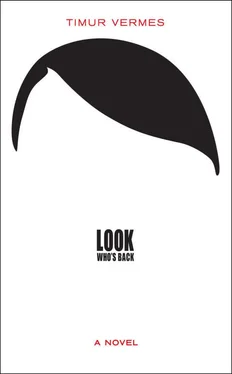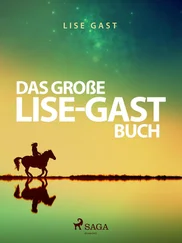“Mehmet,” his progenitor said, pointing at me. “You know this man?”
I could detect a spark in the eyes of this boy whom one could hardly call a boy any longer.
“Hey, man, yeah, of course! That’s the bloke who always does the Nazi stuff…”
Something, at least! There was no denying that his manner of expression was rather sloppy, but what he said was not altogether incorrect. “It is called National Socialism,” I corrected him sympathetically. “Or National Socialist policy, you could also say.” My identity validated, I cast “Cleaner Yilmaz” a look of satisfaction.
“It’s that Stromberg,” Mehmet said confidently.
“Epic,” his friend said. “Stromberg in your laundry!”
“No,” Mehmet corrected himself. “It’s the other Stromberg. The one from the send-up.”
“No way!” the friend said “The other Stromberg! In your laundry.”
I was keen to come back with a response, but was simply too exhausted. Who was I again? Petrol-pump man? Fishing man? Strom-man?”
“Can I have an autograph?” a delighted Mehmet asked.
“Yeh, me too, Herr Stromberg,” the friend said. “And a photo!” He waved a tiny instrument at me as if I were a dachshund and it a canine treat.
It was infuriating.
I took the receipt for my uniform, consented to have a souvenir photograph taken with these strange companions and left the cleaner’s, but not before I had signed two sheets of tissue paper with the colour pen I was handed. A brief crisis followed the autographing, when complaints were aired that I had not signed “Stromberg”.
“Look, it’s obvious,” the friend said reassuringly, although it was unclear whether he was trying to placate Mehmet or me. “That’s not Stromberg!”
“You’re right,” Mehmet agreed. “He’s not Stromberg. He’s the other one.”
I must concede that I had underestimated the enormity of the task facing me. Back then, after the Great War, at least I was the anonymous man from the heart of the Volk. Now I was Herr Stromberg — not the first Stromberg, but the other one. The man who always did the Nazi stuff. The man who did not care which name he put on a sheet of tissue paper.
Something had to happen.
Fast.
Fortunately something had happened in the meantime. When, lost in thought, I returned to the kiosk I noticed two men in sunglasses talking to the newspaper vendor. They were wearing suits, but not ties; they were youngish, around thirty perhaps. The shorter of the two may even have been younger, but because of the distance between us I could not quite tell. I was surprised that, despite his manifestly good-quality suit, the older man was unshaven. As I neared them, the newspaper seller beckoned me over excitedly.
“Come here, come here!”
Turning to the men he said, “That’s him! He’s brilliant. He’s mad! Puts all the others in the shade.”
I refused to allow myself to be rushed. The true Führer senses at once when others attempt to seize control of a situation. When others say, “Quick, quick,” the true Führer always endeavours to forestall an acceleration of proceedings and avoids being hurried into an error. How does he achieve this? By displaying prudence while others scuttle around like headless chickens. Of course, there are moments in which speed is necessary, for example when caught inside a blazing house, or when essaying a pincer movement to encircle a large number of English and French divisions and grind them down to the last man. But these situations are rarer than one might imagine, and in everyday life prudence — always closely allied with keen resolve — holds the upper hand in the overwhelming majority of cases, just as in the horror of the trenches the survivor is often the man who strolls along the line with a cool head, puffing away on a pipe, rather than bustling back and forth like a washerwoman, snivelling all the while. Pipe-smoking is naturally no guarantee of survival in a crisis; pipe-smokers have been killed in world wars, too. Only a simpleton might assume that smoking a pipe would offer some sort of protection. On the contrary, survival is perfectly possible without a pipe, even without any tobacco at all. I, who have never smoked, am testament to that.
Such were my thoughts as the newspaper vendor approached me impatiently. He practically shunted me like a mule over to the small “conference”. I may have appeared somewhat hesitant; although not insecure, I would have felt more confident in my uniform. But nothing could be done about that now.
“Here he is,” the newspaper seller repeated with uncustomary excitement. “And these,” he said, indicating the two men, “are the people I told you about.”
The older man was standing at one of the high tables. With one hand in his pocket, he was drinking coffee from a paper cup, a receptacle I had frequently seen used by workers over the past few days. The younger of the two put down his cup, pushed his sunglasses up to just below his short hair, which was styled with an excessive volume of cream, and said, “So you’re the boy wonder. Well, you need to work a bit at the uniform.”
I gave him a brief, superficial glance and turned to the newspaper seller. “Who is this?”
The vendor went red in the face. “These gentlemen are from a production company . They make programmes for all the major channels. MyTV! R.T.L.! Sat 1! Pro Sieben! All the private ones! That’s about right, isn’t it?” This last question was aimed at the two gentlemen.
“That is about right,” the elder man said patronisingly. Then he took his hand from his trouser pocket and offered it to me. “Sensenbrink, Joachim. And that’s Frank Sawatzki, he works with me at Flashlight.”
“I see,” I said, shaking his hand. “Hitler, Adolf.”
The younger one smirked, a rather haughty smirk to my mind. “Our mutual friend has just been raving about you. Go on, say something then!” With a grin he put two fingers to his top lip and said in a strangled voice, “Ve hav been returning fire sinz qvarter to six!”
I turned to the man and scrutinised him closely. Then I permitted a short period of silence to descend on proceedings. Silence is often underestimated.
“So,” I said. “You wish to talk about Poland. Poland. Fine. What exactly do you know about the history of Poland?”
“Capital: Warsaw. Invaded 1939, divided with the Russians…”
“That,” I interrupted him “is merely what the books say. Any old halfwit could root that out. Answer the question!”
“But I…”
“The question! Do you not understand German, man? What! Do you! Know! About! The history! Of Poland!”
“I…”
“What do you know about Polish history? Do you know the contexts? And what do you know about the Polish racial mix? What do you know about Germany’s so-called Poland policy after 1919? And seeing as you mention returning fire, do you have any idea where?”
I paused briefly to allow him to regain his breath. One must choose the apposite moment to crush one’s political opponent. Not when he has nothing to say. But when he is attempting to say something,
“I…”
“If you heard my speech, then surely you must know how it continues.”
“The…”
“I’m sorry?”
“But, I mean we’re not…”
“Let me help you: ‘Henceforth…’ — now do you know how it goes?”
“…”
“‘Henceforth bomb will be met with bomb.’ Write it down, maybe someday you will be interrogated again about great quotations in history. But perhaps you are better in the field. You have 1.4 million men at your disposal and thirty days in which to conquer an entire country. Thirty days and no more, for in the West the English and French are feverishly preparing for war. Where do you begin? How many army groups do you create? How many divisions does the enemy have? Where do you expect to meet the greatest resistance? And what do you do to prevent the Roumanians becoming involved?”
Читать дальше












